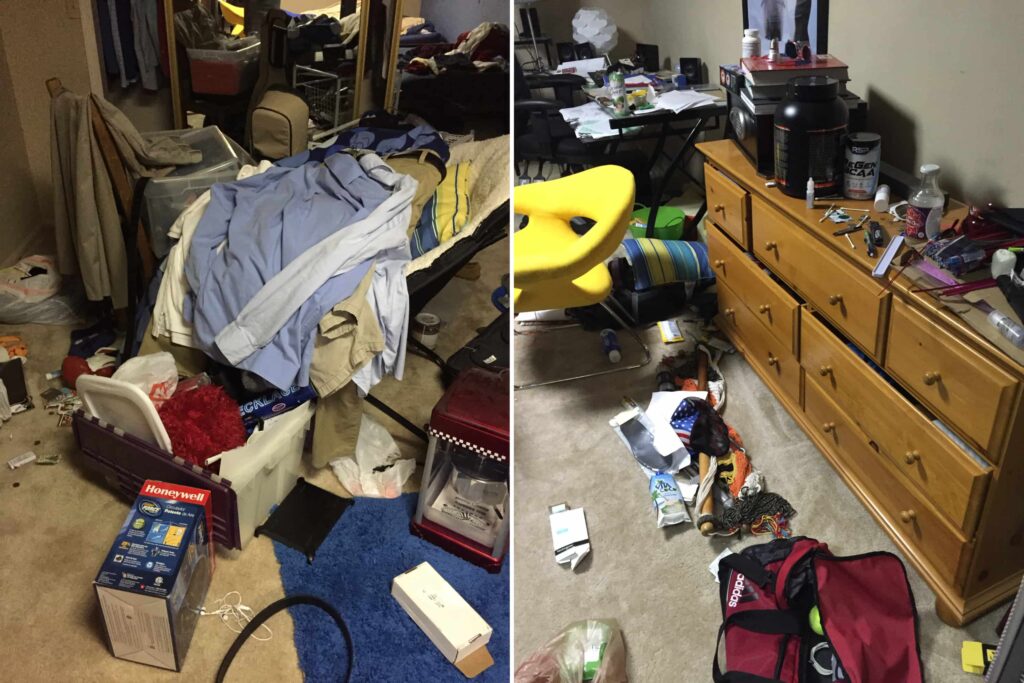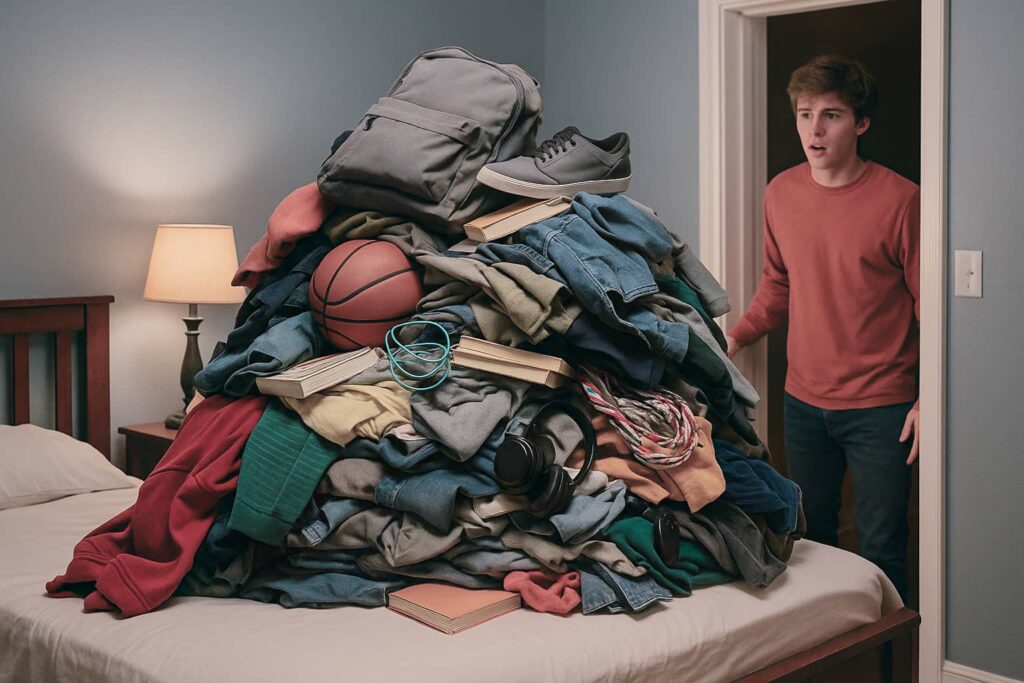Oh my gosh, did you see Palmer’s email last week—the one with the towering pile of dirty laundry? I laughed out loud! Maybe it was a slightly trauma-induced laugh…it brought back so many memories of trying to get Palmer, my strong-willed middle son, to clean his room as a teenager. It was a serious challenge!
I pulled up photos of Palmer’s room from back when he was 16 to see if it was really as bad as I remembered. You tell me… would YOU want your kid’s room to look like this? 😭

I love Palmer’s point in last week’s email about avoiding battles over chores. AND…as the mom in that story, I want to add: not fighting doesn’t mean we do nothing. It means teaching responsibility without constant conflict. It means being empathetic, kind, AND firm. It also means accepting the reality that we cannot force kids to do things; but we can make them wish they had. 😉
By 16, Palmer had made it clear: he was fully committed to winning any battle of wills. That’s normal—it’s a teenager’s job to differentiate. But it was still my job to prepare him for adulthood without turning our home into a war zone.
If I could have cast a magic spell to make him clean up, I would have. 🪄But since I’m no Hermione, I had to plod away, trying to Muggle my way through preparing a tough, defiant, teen boy for adulthood. Here’s what helped:
| 1. “I’m willing to…”We had a house cleaner, Bertha, but I told the kids: “Her job is to clean, not to pick up after you.” If their rooms were straightened up, Bertha would clean them. If not, there was no lecture, no warning… I simply left a note on the door, telling her not to clean that room. 2. “You’re welcome to…”Palmer was welcome to go out on weekends—after his room was cleaned: floors cleared, trash out, bed made, room dusted and vacuumed. Calmly stated ahead of time. No arguing. 3. Brace for pushback.Palmer pushed hard. Said mean things. I had to do my own work (therapy, parent coaching, centering) to stay calm and not get dragged into the drama. 4. Follow through.Setting limits is easy; following through is the hard part. I planned my responses ahead, knowing he loved to “outwit, outplay, outlast” like a teenage Survivor contestant. On my good days, I showed empathy instead of arguing: “I understand that you think this is dumb and it makes sense that you’re annoyed. I love you too much to argue about it.” It drove Palmer nuts, but it was true – I DID get it and I DID love him too much to yell at him. 5. Find my “yes.”When he asked to go out, I’d say, “Yes, as soon as your room is clean.” He’d do a half-hearted job, and I’d remind him it had to be cleaned to my satisfaction. Then he’d pick up a little more and ask me to check it – again and again – until we were both frustrated. to get off the inspection merry-go-round, I introduced a new rule: one free room check, then $2 cash for each extra inspection. Problem solved. |
Progress was slow and uneven. Sometimes he cleaned. Sometimes he stayed home. Sometimes when I didn’t want to engage in the nonsense, I just texted him photos of the messes that still needed to be cleaned. This reduced negative engagement between us.
One night he ignored the rules and went out without cleaning. I didn’t fight, because I couldn’t physically force him to stay. It didn’t feel great in the short term but it bypassed a big, angry conflict. Sometimes it’s better to let our kids THINK they’ve gotten away with something and then later, on our terms, we show them that they were sorely mistaken. While he was out, I piled every stray item onto his bed. When he got home late at night, went to his room, and saw the mountain of junk, the bellowing that followed made me chuckle. There had been no fighting. No power struggle. But the message was clearly sent from mom to teen: “You can clean up on your terms or live with what I choose to do about you NOT cleaning up.”
I was determined to demonstrate that life was better for Palmer when he did his chores. I also wanted him to know that when he didn’t do them, I wasn’t stressed – au contraire – I was likely to find a way to make it interesting or satisfying for myself. Not being able to make me mad, and not knowing how I was going to respond sucked some of the fun out of his defiance.
I had to learn to be flexible. Some weeks the room stayed messy because I didn’t draw a line in the sand every week. I wasn’t aiming for perfection; I was just making sure that he had opportunities to practice the skills he’d need as an adult, like cleaning up after himself.
Today, at 27, Palmer lives in a clean, organized house. Sure, maybe he still plays occasional Jenga with his laundry, but he’s fully capable—and we managed to get here without any last resentment.
Raising kids isn’t about winning every battle. It’s about building the habits, little by little, that will carry them into adulthood. Stick with it—you’re planting seeds that will bloom long after the mess is gone.



